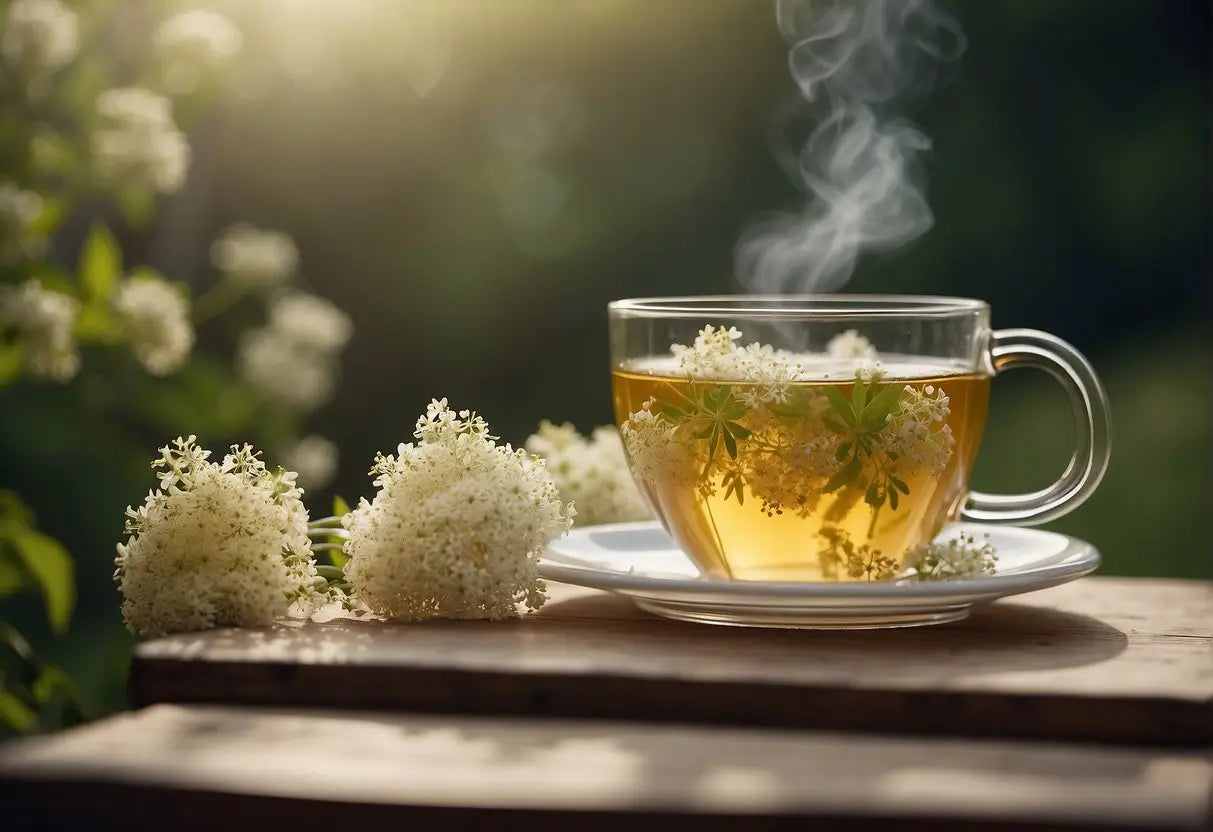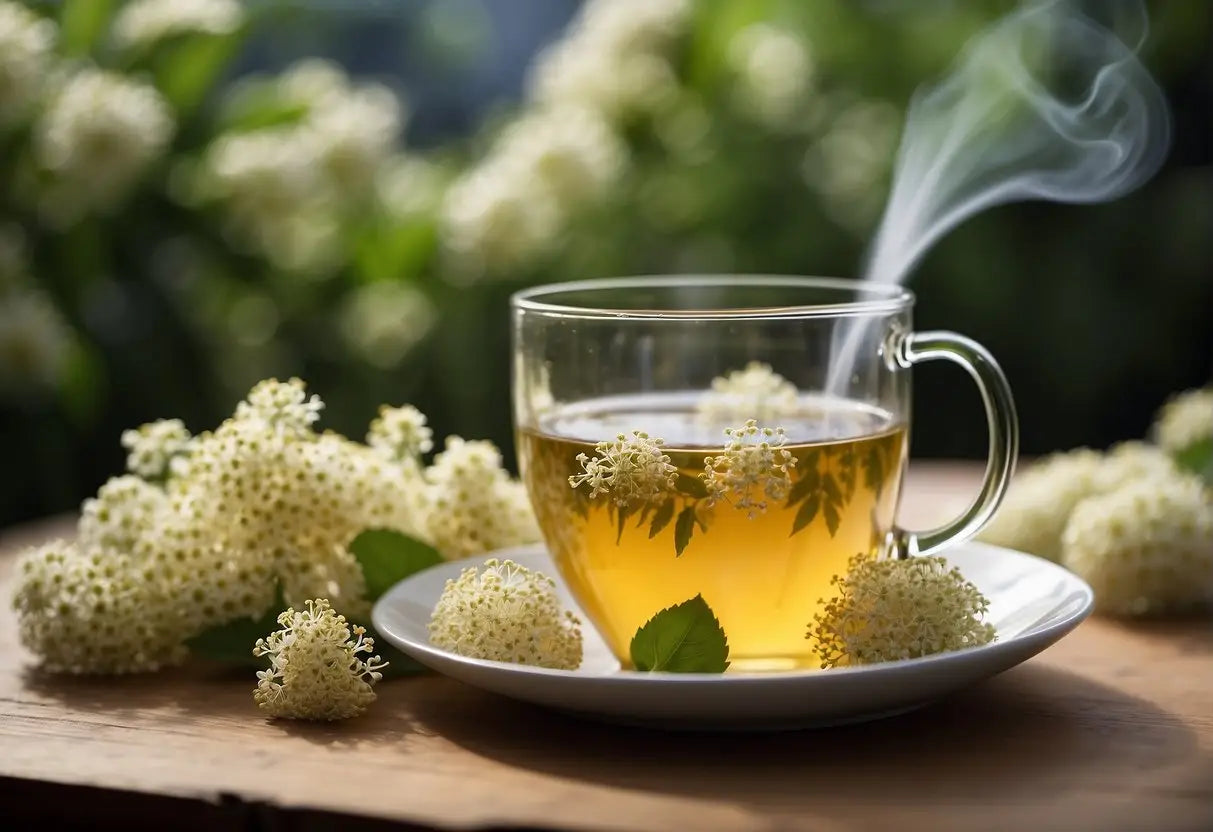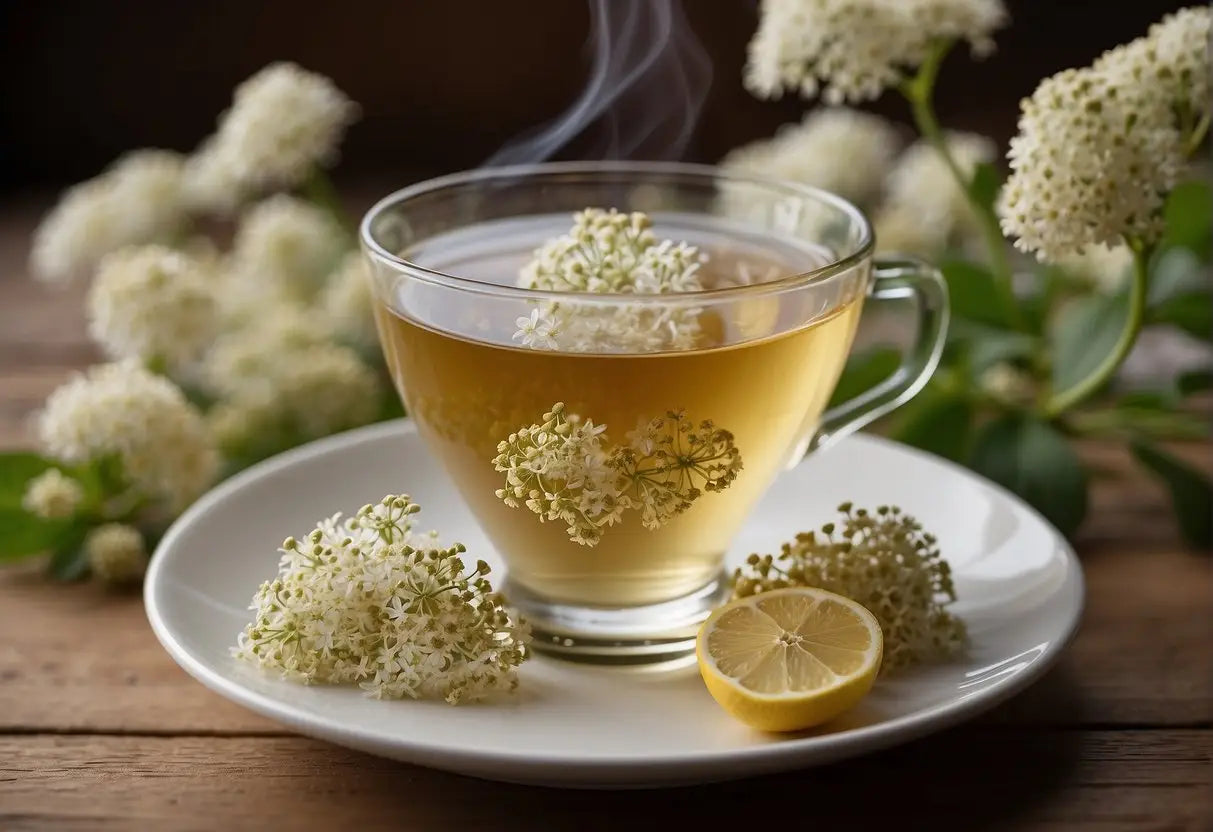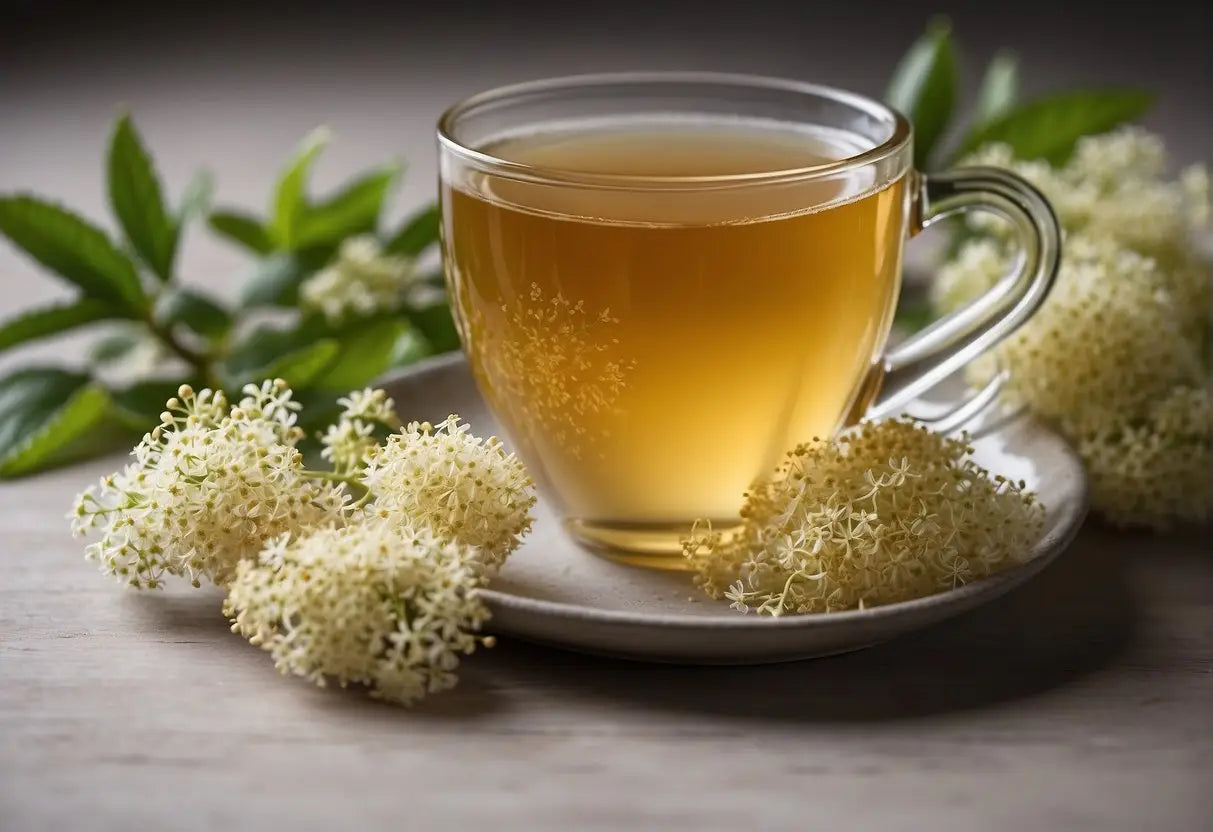Elderflower Tea Benefits
Overview of Elderflower Tea
Elderflower tea, derived from the blossoms of the elder tree (Sambucus nigra), has been a traditional drink in many cultures for centuries. The elder tree is native to Europe but is now widely cultivated across the globe. When you brew these delicate flowers, the resulting tea is light and refreshing with a subtle, sweet floral taste.
Nutritional Profile: Your cup of elderflower tea contains a variety of essential nutrients:
- Vitamins: Particularly rich in Vitamin C.
- Flavonoids: Known for their antioxidant properties.
- Phenolic Acids: Compounds with potential anti-inflammatory effects.
For Health and Wellness: Consider drinking elderflower tea for its potential health benefits:
Bestsellers
- Respiratory Health: May soothe common cold and flu symptoms.
- Immune Support: Vitamin C and antioxidants could help bolster your immunity.
- Skin Health: Antioxidants and anti-inflammatory effects may contribute to skin health.
- Digestive Aid: Traditionally used to promote healthy digestion.
Preparation Tips: To enjoy your tea, steep dried elderflowers in hot water for about 10-15 minutes. You may adjust the amount of elderflower and steeping time to suit your taste preference.
It's important to note that while elderflower tea is generally considered safe, you should avoid drinking it excessively. Always ensure you're using flowers from the Sambucus nigra species, as other elderberry plants can be toxic if not correctly prepared. Pregnant and breastfeeding women, children, and individuals on certain medications should consult a healthcare provider before consuming elderflower tea.
Health Benefits

Elderflower tea has a myriad of health benefits, focusing primarily on bolstering your immune system and reducing inflammation. Each element of this tea plays a specific role in enhancing your overall well-being.
Immune System Support
Elderflower tea is rich in vitamin C, a crucial nutrient for strengthening your immune defense. Regular consumption can aid in building your immunity, making it easier for your body to ward off colds and flu.
- Vitamin C content: Helps in the production of white blood cells, vital for fighting infections
- Antiviral properties: Contains compounds that have been found to combat certain viruses
Anti-inflammatory Effects
The anti-inflammatory properties of elderflower tea may help reduce pain and swelling.
- Flavonoids: These natural compounds can help lower your body's inflammation response
- Rutin: A powerful antioxidant in elderflowers that supports blood vessel health
Respiratory Health Enhancement
This tea may play a role in soothing your respiratory system, providing relief from common ailments such as cold and allergies.
- Expectorant effects: Helps in loosening mucus, thus easing cough and congestion
- Sinus relief: Aids in reducing the severity of sinus-related headaches
Digestive Health Improvement
Your digestive system can benefit from the natural laxative effect of elderflower tea, improving bowel movement and alleviating various digestive problems.
- Fiber: Elderflower contains a modest amount of dietary fiber which promotes digestion
- Mucous membrane support: Soothes the lining of the digestive tract
Skin Health Fortification
Topical application and drinking elderflower tea might contribute to healthier, more resilient skin.
- Antioxidants: Fight free radicals, which can help in preventing premature skin aging
- Detoxifying effects: Assists in clearing toxins from the body, which can reflect in the skin's appearance
Nutritional Content

Elderflower tea is renowned for its potential health benefits, which stem from its rich nutritional profile. Vitamin C is particularly abundant in elderflower tea, serving as a powerful antioxidant that aids in immune system function and skin health.
Here's a breakdown of the key nutrients you can find in elderflower tea:
Lao Ban Zhang
- Vitamins: It contains modest amounts of certain B vitamins such as niacin and B-6, both essential for energy metabolism.
- Minerals: Elderflower tea provides minerals including potassium, which is essential for heart and muscle function, and calcium, important for bone health.
To illuminate the nutritional value, see the table below for approximate content in a standard cup of elderflower tea:
| Nutrient | Approximate Content |
|---|---|
| Vitamin C | High |
| Niacin (B3) | Moderate |
| Vitamin B-6 | Moderate |
| Potassium | Moderate |
| Calcium | Low to moderate |
Remember, while elderflower tea can contribute to your daily intake of these nutrients, it should be complemented with a balanced diet to ensure you're meeting all of your nutritional needs. Enjoy your tea as part of a varied diet.
Antioxidant Properties
Elderflower tea is packed with antioxidants, which are compounds that help protect your cells against oxidative stress caused by free radicals. These antioxidants include vitamin C, flavonoids, and phenolic acids.
- Vitamin C: An essential nutrient that your body requires to perform several functions. It's known for its role in supporting the immune system and is also a powerful antioxidant.
- Flavonoids: These plant-based compounds have a significant antioxidant effect and contribute to the reduction of inflammation in your body. Elderflower tea contains flavonoids like quercetin and kaempferol.
- Phenolic Acids: This group of antioxidants has been associated with several health benefits, including anti-inflammatory and antiviral properties.
When you consume elderflower tea, these antioxidants work synergistically to help:
- Neutralize harmful free radicals.
- Support your immune system.
- Reduce inflammation.
Furthermore, the antioxidant properties of elderflower tea may have positive effects on your skin health by potentially reducing the appearance of signs of aging, and on your cardiovascular health by aiding in the protection of your heart and blood vessels.
By incorporating elderflower tea into your routine, you may be able to harness these beneficial antioxidant properties. Regular consumption can be a part of a balanced diet aimed at maintaining overall health and well-being. Remember to always consult with a healthcare provider before adding new herbal teas to your diet, especially if you have pre-existing health conditions or are on any medication.
Historical Uses
Elderflower has been a staple in traditional medicine across various cultures. You may find that its uses span centuries and continents. In Ancient Egypt, elderflower was lauded for improving complexion and healing burns. As you examine historical texts, you'll learn that the Romans used elderflower infusions to alleviate a host of maladies.
During the Renaissance period, European herbalists commonly employed elderflower. Your ancestors might have used it for its diuretic and anti-inflammatory properties. Notably, elderflower was a component in a preparation known as "Sambucus," a concoction named after the Latin genus Sambucus nigra, the black elderberry plant.
Here is how elderflower was typically utilized in different regions:
-
Europe:
- Respiratory issues
- Fever reduction
-
North America:
- Native American tribes used it for joint pain
- Folk medicine for colds and flu
In traditional English medicine, a simple elderflower cordial could be made each spring. Your heritage may include making such remedies, as they were believed to aid in detoxification and as a general health tonic during that season.
Remember to consult historical sources when exploring the rich past of herbal remedies, as they provide a direct insight into how elderflower was revered and the purposes it served.
Preparation and Consumption Tips

Elderflower tea is a delightful beverage that can be enjoyable and may provide benefits to your health. To ensure you get the most out of it, follow these simple preparation and consumption tips:
Ingredients:
- Dried elderflowers: usually 1-2 tablespoons
- Hot water: about 8 ounces
Instructions:
- Boil the water and let it slightly cool.
- Measure the dried elderflowers. Place them in a tea strainer or infuser.
- Steep the elderflowers in the hot water for about 10-15 minutes.
- Remove the strainer or infuser to avoid over-steeping, which may lead to bitterness.
- Optionally, you can add a sweetener like honey or a slice of lemon for flavor enhancement.
Tips:
- Always use freshly boiled water to maximize the extraction of beneficial properties.
- For a stronger infusion, increase the steeping time, but be mindful not to exceed it too much.
- Consider using loose flowers over tea bags for a more authentic flavor and potential health benefits.
- Consult with a healthcare provider before consuming if you are taking medication, pregnant, or have allergies.
Enjoy your elderflower tea at any time of the day, preferably in a calm setting to fully appreciate its delicate flavors.
Safety and Side Effects

When consuming elderflower tea, it's essential to be aware of possible safety concerns and side effects.
Allergies:
You might be allergic to elderflowers if you have known sensitivities to plants in the same family, such as honeysuckle.
Pregnancy and Breastfeeding:
Elderflower tea consumption is not well-studied in pregnant or breastfeeding women. To ensure your health and safety, consult with your healthcare provider before adding it to your routine.
Interactions with Medications:
Elderflower might interact with diuretics and diabetes medication. Keep a watchful eye and speak to your doctor if you're on any prescription drugs.
| Condition | Suggestion |
|---|---|
| Diabetes | Monitor blood sugar |
| Surgery | Avoid prior to surgery |
Dosage:
Overconsumption could lead to potential adverse effects. Stick to the recommended serving size and avoid long-term excessive use.
Symptoms of Overuse:
- Nausea
- Dizziness
- Weakness
- Upset stomach
In case of experiencing any adverse effects or unusual symptoms, discontinue use immediately and seek medical attention. Always ensure the elderflowers you use are appropriate for tea preparation and haven't been treated with pesticides or other harmful chemicals.
Buying and Storage Recommendations
When purchasing elderflower tea, prioritize organic products to ensure they are free from pesticides. Look for suppliers that provide transparency regarding their sourcing practices and quality assurance.
Here is a brief guideline to ensure you make an informed purchase and store your elderflower tea correctly:
Where to Buy:
- Specialty stores: For high-quality options.
- Online retailers: Convenient, with customer reviews—but verify seller credibility.
- Health food stores: Usually offer organic selections.
How to Choose:
- Packaging: Airtight, opaque containers reduce light exposure.
- Certifications: Look for USDA Organic or Fair Trade labels.
- Harvest Date: Fresher tea has a more potent flavor and benefit.
How to Store:
- Cool, dark place: Prolongs freshness and protects from heat.
- Airtight container: Keeps moisture and odors out.
- Away from spices: Prevents flavor contamination.
Shelf Life:
- Dried elderflower: Up to two years if stored correctly.
- Sealed tea bags: Often have a longer shelf life than loose flowers.
Here is a quick reference table:
| Condition | Storage Method | Expected Shelf Life |
|---|---|---|
| Dried Flowers | Airtight container, cool dark place | Up to 2 years |
| Tea Bags | Original packaging, away from spices | Check expiration |
Remember, the quality of your tea depends not only on the quality at the time of purchase but also on how well you store it.
← Older post Newer post →











